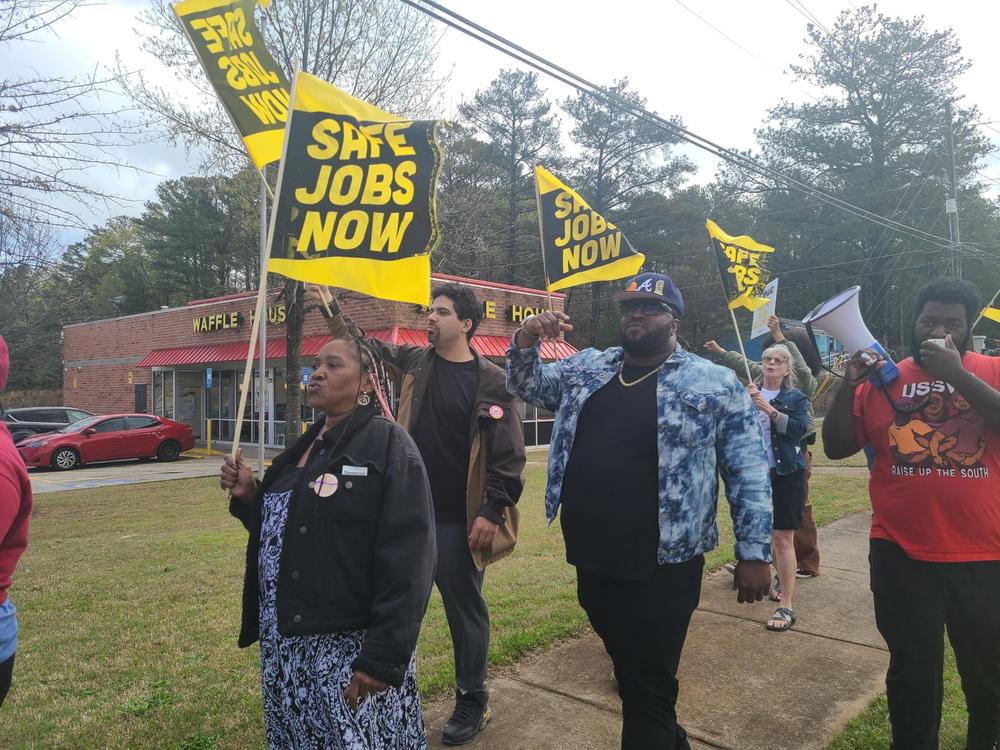
Caption
Protesters marched past Waffle House #1091 the location where employees Katie Giede and Cindy Smith went on strike.
Credit: Amanda Andrews / GPB News
GPB's Amanda Andrews reports on the tip vs wage debate in restaurants and workers's efforts to organize for higher wages.
__
The inside of a Waffle House is filled with sounds from the chefs working the grill, to the host calling out orders and cleaning plates. But recently, workers have been making noise outside the Waffle House.
In March, longtime Conyers Waffle House employees Cindy Smith and Katie Giede led a group of about 50 protesters and union members in chants right outside the building where they usually work.
“We deserve $25 an hour,” Giede said. “We deserve 24/7 security. We deserve an end to unfair paycheck deduction. And we deserve respect from management.”

Protesters marched past Waffle House #1091 the location where employees Katie Giede and Cindy Smith went on strike.
The protest was part of a week-long strike supported by the Union of Southern Service Workers, an organization not officially recognized by Waffle House. The group has helped organize protests in Georgia, North Carolina, and South Carolina.
“If nobody ever stands up, nothing will change”, Giede said. “But if we all band together, they have no option. They can't screw us all over.”
Federal minimum wage is $7.25 an hour, but restaurant workers like the people at the Waffle House are paid a tipped wage. They can make as little as $2.13 an hour plus tips. Cindy Smith said her pay hasn’t changed in years.
“The wages have been the same since I started. $2.92 an hour,” she said. “Not including tips, since I started in 1995.”
Then there’s meal deduction. According to USSW workers and reviews on the popular website Glassdoor.com, Waffle House reportedly takes at least $3 from worker’s checks to pay for an on shift meal whether they eat it or not. Smith is a mother, and she said even with tips she only makes $16,000 a year.
“I go to bed hungry most nights,” Smith said of her nearly 30 years at Waffle House. “I've lost 192 pounds. Not because I want to, but because I haven't been able to eat. I can't afford groceries. I can't afford rent. If it wasn't for my son's dad, I wouldn’t have anywhere to live.”
The protesting workers filed a complaint with the U.S. Department of Labor about the deduction.
GPB reached out to Waffle House about meal deduction and worker pay, and a VP of Public Relations responded in an email, saying the company had no statement.
In April, a few weeks after the protest, Hanna Goldberg, a researcher at City University of New York who is studying the tip vs wage debate in restaurants, told GPB workers are very happy adding around 20% of their tables’ tabs to their take home pay.
“Workers' attachment to this system and commitment to tip earning is exponentially higher in the fine dining sector, where menu prices are higher and tip income is higher than, in the middle range or, lower price chain restaurants,” she said.
For example, a 20% tip on the Waffle House All Star special is just $2.37.
Goldberg said the instability of the restaurant industry in general is another reason wages are low.
“Labor costs are an extremely large piece of the picture when you're talking about the capital investment in, restaurants,” she said. “And so employers definitely push this narrative that, oh, well, if wages go up, we might just go out of business. Or if wages go up, we're going to have to lay off half of you or more.”
Being fired for almost any reason, even union organizing, is a very real concern in Georgia, where Waffle House is headquartered. Georgia is one of 28 states with so-called 'right to work' laws.
On April Gov. Brian Kemp signed on to a letter along with the governors of Alabama, Mississippi, South Carolina, Tennessee and Texas speaking out about the United Auto Workers unionizing campaign, writing, “Unionization would certainly put our states’ jobs in jeopardy ... The experience in our states is when employees have a direct relationship with their employers, that makes for a more positive working environment."
The Georgia Department of Labor defines the meaning of "right to work" as workers not being required to join a union or make payments to a union as a condition of employment.
But Atlanta North Georgia Labor Council President Sandra L. Williams said many people don’t understand the term.
“We ask job candidates, 'Well, are you for or against right to work?' And we've had some people that unknowingly said, 'Oh, we're definitely for right to work.'" Williams said ultimately the legislation benefits employers over the workers. “Once explained, it just means you have the right to terminate without cause,” she said.
Which can leave employees who really want a union very scared to speak up.
“We have people here that are frightened to lose their job”, Williams said. “What they have seen in the past is that if you start that union, talk, if you will. We're gonna get rid of you because you are a troublemaker.”
Waffle House labor organizers like Katie Giede said they are not deterred.
“We will not be intimidated by scare tactics, and we will keep coming together until the changes happen.”